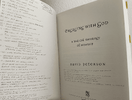pgwolv
Puritan Board Freshman
My wife and I often discuss the fact that I’m a head-first person and she’s a heart-first person. We both have to be careful of letting one of those faculties dominate, as a balance is needed.
I love reading reformed books, but I tend to let it inform me without letting it stir up my heart to worship and to change where change is needed. Now, obviously, the Bible read prayerfully is the number one thing to do. But second to that, I would like some recommendations on reformed books that can help me with this.
One on my reading list is Packer’s Knowing God, as I think it should strike a good balance for me. Any other book recommendations, advice, and personal testimony to this regard would be much appreciated.
I placed this thread in the Christian Walk forum, under Spiritual Warfare, as it seems relevant and I was uncertain where else to put it.
Blessings to all
I love reading reformed books, but I tend to let it inform me without letting it stir up my heart to worship and to change where change is needed. Now, obviously, the Bible read prayerfully is the number one thing to do. But second to that, I would like some recommendations on reformed books that can help me with this.
One on my reading list is Packer’s Knowing God, as I think it should strike a good balance for me. Any other book recommendations, advice, and personal testimony to this regard would be much appreciated.
I placed this thread in the Christian Walk forum, under Spiritual Warfare, as it seems relevant and I was uncertain where else to put it.
Blessings to all


